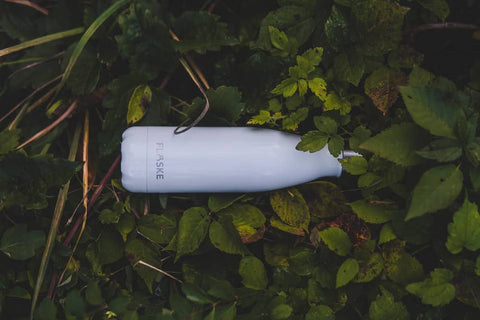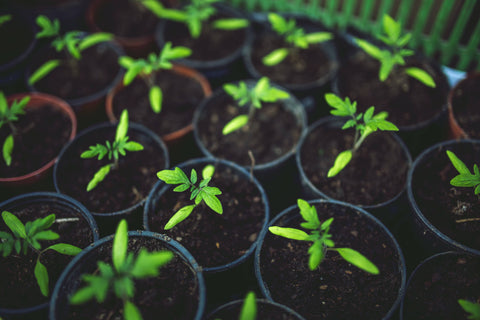Whether you're going green to save money, improve your health, or help the environment, every step towards eco-friendly living is a step in the right direction.
If you're new to the concept of eco-friendly living, then you might not know where to start. Don't be discouraged. Adopting an eco-friendly lifestyle is a journey that will take time to adjust to.
Here are ten eco-friendly living tips to help you on your way.
Top Ten Tips for Eco-Friendly Living
Living an eco-friendly lifestyle is not as hard as you think. Use these ten easy eco-friendly living tips to become more sustainable in your daily life!
Ditch Single-use Plastic
Look around your home. Take note of how many single-use plastic items you see. Single-use plastic is everywhere, especially in our kitchens, but reducing your dependence on single-use plastic is easier than you might think.
Bringing a reusable cotton tote when you go shopping and purchasing loose fruits and veggies will significantly reduce the plastic in your home. You can also stop buying bottled water. Instead, take a reusable water bottle everywhere you go.

Buy Eco-Friendly Living Products
Everything you buy has a carbon footprint. If you want to adopt eco-friendly living principles, you'll need to start shopping more carefully. Try searching for environmentally conscious companies that sell eco-friendly living products, such as reusable water bottles and plastic-free cleaning products. Other eco-friendly products to look out for include natural toiletries and alternatives to single-use plastics.
Repair, Reuse, Recycle
You've probably heard of the Three R's before, but do you use them in your daily life? When something is broken, take it to your local repair shop before putting it in the trash. And, if something can't be fixed, can you find another use for it? Can you upcycle it?
Remember that recycling is an energy-intensive process that should be a last resort. So, always repair and reuse before recycling.
Drive Less
If it's possible to travel by public transport, carshare, cycle, or walk, do so instead of driving. You can reduce your environmental impact by driving less or switching to an electric-powered vehicle.
People who live on public transport routes or near a city centre may not need a car at all. Alternatively, choose a fuel-efficient or electric vehicle when you need to drive. Make sure you inflate the tyres properly and reduce your speed to the optimum level for your car.
Reduce Food Waste
In developed countries, we waste millions of tonnes of food every year. Aside from wasting your money, throwing out tons of food leads to increased greenhouse gases released from landfill sites.
Storing fresh produce correctly can help you reduce the amount of food you waste. So can a set of reusable food storage containers. Try putting your leftovers from dinner into a reusable food pot and eating them for lunch the next day.

Eat Less Meat
You don't have to switch to a 100% plant-based diet to live an eco-friendlier lifestyle. But reducing the amount of meat on your plate, particularly red meats, is one of our eco-friendly living tips.
It's no secret that animal agriculture is highly unsustainable and a major contributor to greenhouse gas emissions. What's more, regularly eating low-quality meats isn't great for your health. Taking meat off the menu a few days a week will help to keep the planet clean and your body healthy.
Switch to Renewable Energy
Renewable energy is now widely available and highly affordable. Switching to a 100% renewable energy supplier may save you money and help you live more sustainably. Plus, if you own your property, installing solar panels on your roof lets you benefit from free electricity!
Shop Locally
Clothes, food, electronics, or other items, the closer to home you buy your products, the fewer miles they will have to travel. Transporting food and other commercial products increases their carbon footprint. So, support your local economy and buy locally produced goods whenever you can.
Say No to On-The-Go Plastics
Like reducing the single-use plastics in our household, eliminate the single-use plastics that you use away from home. Saying no to disposable plastics can be challenging, but it's easy if you're organised.
Remember to travel with a refillable water bottle and take an insulated travel coffee mug whenever you want a takeaway coffee. Bring your own reusable bag, buy snacks in recyclable packaging, or sit to eat instead of getting a takeaway.
Also Read: How to tackle waste with your morning coffee routine.
Grow Your Own
Growing fruits and vegetables at home is a rewarding way to reduce your carbon footprint and save money. If you have a back garden or an allotment, you're already set to grow!
Growing your own food isn't limited to homeowners though. Anyone living in an apartment or renting a flat short-term can try growing herbs, shallow-rooted veggies such as spring onions, lettuce, and leeks, or fast-growing fruits like strawberries and raspberries. All you need is some window boxes, hanging baskets or small pots.

Want more tips and advice for eco-friendly living? Why not subscribe to the FLASKE Blog so that you don't miss out on our eco-friendly living tips and sustainable product updates.

